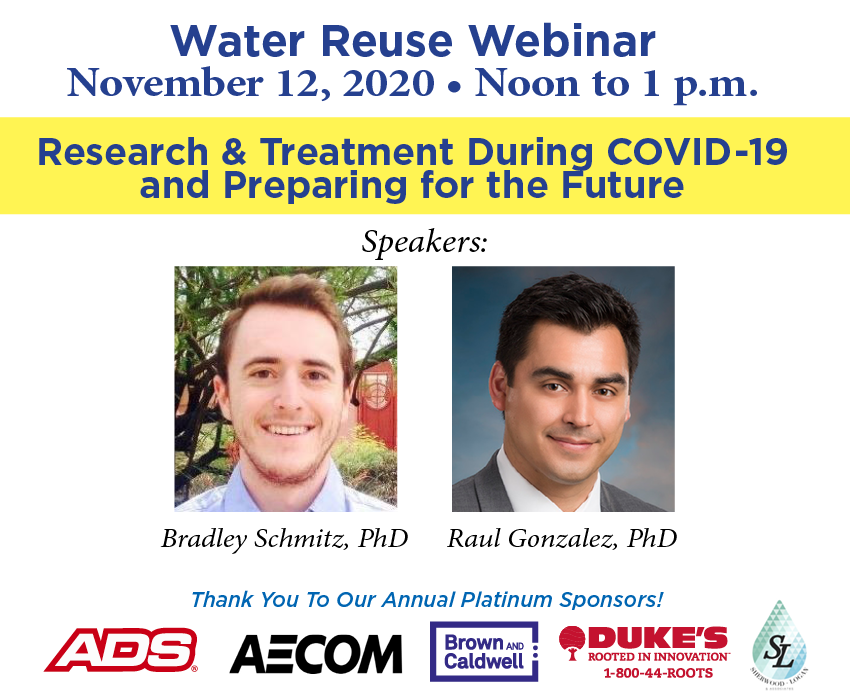NOV 12: Water ReUse Webinar
Click below to register. **NOTE** CWEA & CSAWWA members: Enter discount code at registration to receive FREE Webinar.Non-Members will be billed $10.


Presentation 1: "Wastewater Based Epidemiology for Tracking the Prevalence of COVID-19 in Communities"
Wastewater based epidemiology (WBE) is a powerful and promising tool for community surveillance of COVID-19 infection. Combining wastewater and clinical databases can help understand the prevalence of current and future outbreaks of disease. Research teams around the world have been working to optimize methods for detecting SARS-CoV-2 in wastewater. This presentation will highlight the current state of WBE for COVID-19 including sample collection, data analysis, and caveats, as well as implication for water reuse. This presentation will also highlight examples on how utilities, universities, and public health officials around the nation are currently implementing WBE, interpreting results, and communication with stakeholders.
Bradley Schmitz, PhD, Loudoun Water: Bradley Schmitz is an Environmental Scientist at Loudoun Water in Northern Virginia. He received his Ph.D. in Environmental Microbiology from the University of Arizona and previously held two postdoc positions at the National University of Singapore and Johns Hopkins University. During his time in academia, Bradley’s research focused on the intersection between water and public health. His research background focuses on viruses in non-potable and potable reuse schemes. In his current role at Loudoun Water, Bradley is working to increase the organizations involvement in research and exploring potential water reuse opportunities.
Presentation 2: "COVID-19 Surveillance in Southeastern Virginia Using Wastewater-Based Epidemiology"
Wastewater-based epidemiology (WBE) analyzes biomarkers in wastewater to characterize emerging chemicals, drug use patterns, or disease spread within communities. This approach can be particularly helpful in understanding disease outbreaks like the novel Coronavirus disease-19 (COVID-19) when it is combined with clinical datasets. Three reverse transcription-droplet digital PCR assays (N1, N2, N3) were used to detect severe acute respiratory syndrome coronavirus 2 (SARS-CoV-2) RNA from weekly wastewater samples in Hampton Roads Virginia. Throughout our study, SARS-CoV-2 concentrations ranged from 70 to 14000 genomic copies/100 mL in samples where viral RNA was detected. Fluctuations in population normalized loading rates in several of the wastewater treatment facilities service areas agreed with known outbreaks during the study. Regionally, SARS-CoV-2 concentrations and loads have proven to be a leading indicator of confirmed clinical cases.
Raul Gonzalez, PhD, HRSD: Raul Gonzalez is an Environmental Scientist at Hampton Roads Sanitation District (HRSD) where he runs HRSD’s molecular pathogen program. His focus is on applying state-of-the-art molecular methods to manmade infrastructure and their receiving waters. Since he started at HRSD, Raul has worked on using DNA-based markers in collection systems to identify compromised sewer infrastructure. He has also quantified the effectiveness of various wastewater and drinking water treatment trains based on pathogen removal. Recently he has used quantitative microbial risk assessment to address local water quality issues. He is a native of California where he received his BS in biology at UCLA. After a short stint at Los Angeles County Sanitation Districts, he moved to North Carolina to complete his PhD in Environmental Sciences and Engineering from UNC-Chapel Hill.















